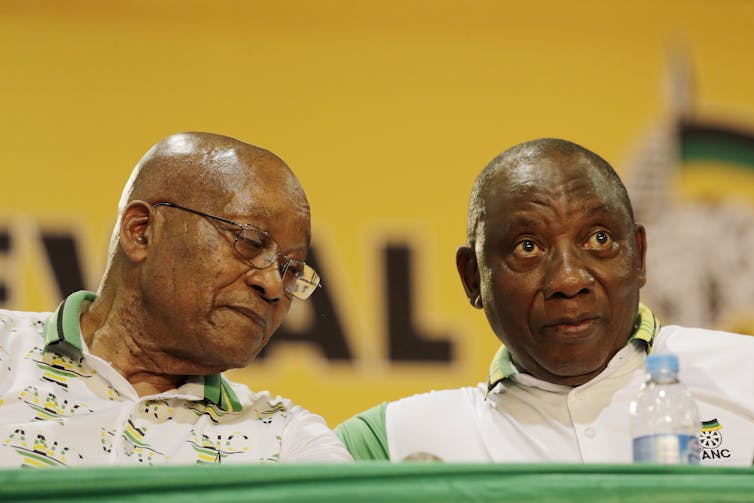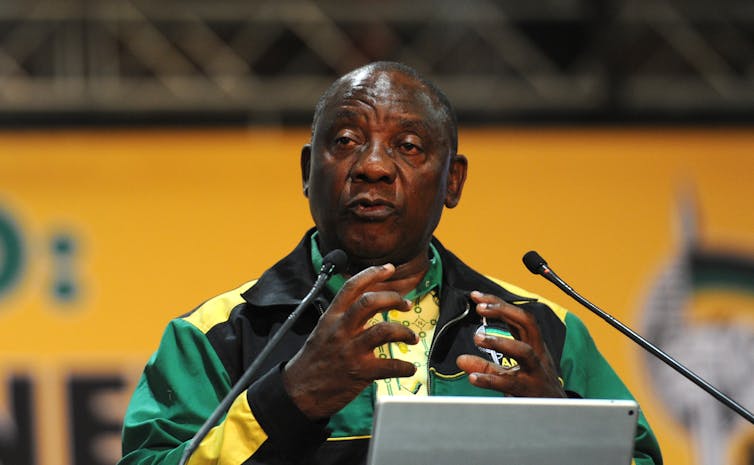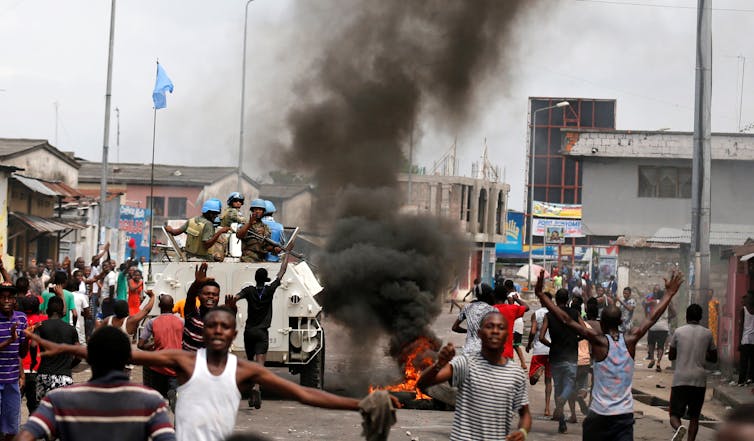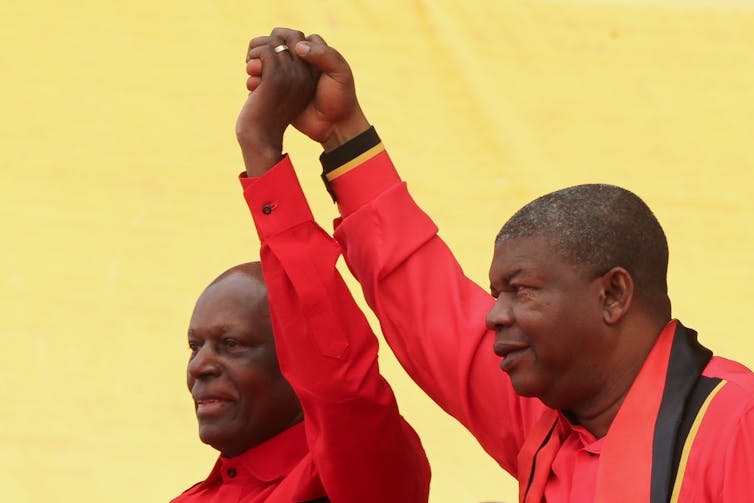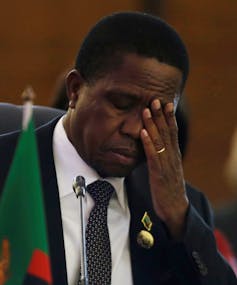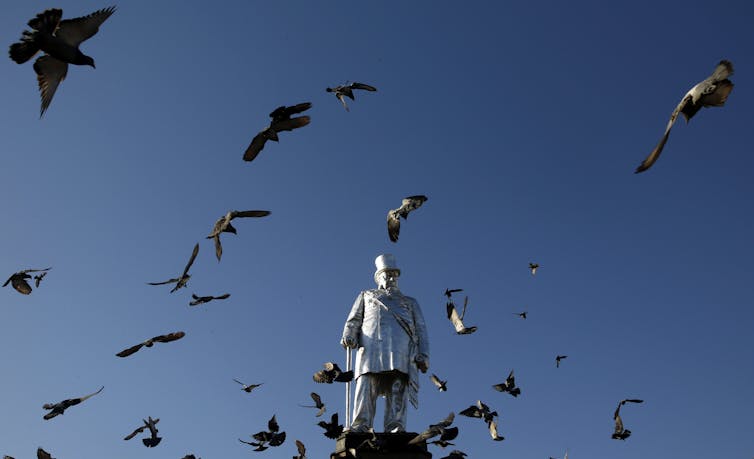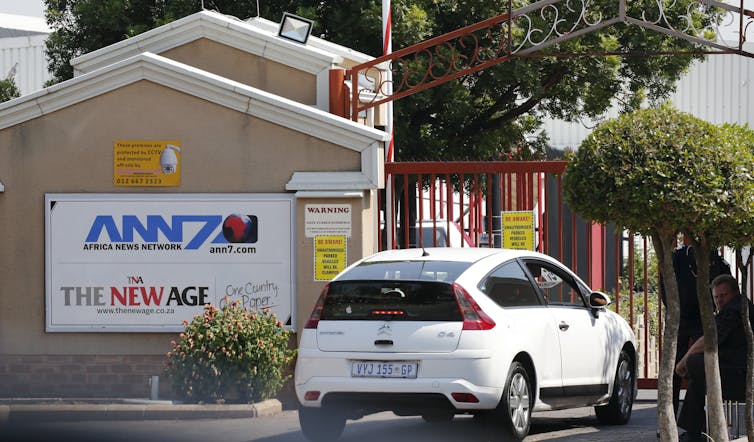
Television news station linked to the Guptas faces imminent closure.
Reuters/Siphiwe Sibeko
The closure of any media outlet is normally mourned by all journalists, because of the loss of jobs, diversity and competition. But the announcement that South African pay-TV operator Multichoice will not renew the contract of news channel ANN7 will be no great loss to the news media, or the public debate.
It will, though, be a setback to the corrupt three-way state capture conspiracy which brought together ANN7, Multichoice and elements of the government, as exposed by the now notorious Guptaleaks emails.
The emails were leaked some months ago from inside the Gupta clan. The family has been at the centre of state capture accusations in South Africa because of its extraordinary influence over President Jacob Zuma, his family and members of his Cabinet. The allegations of corruption have extended to Multichoice. It stands accused of making multi-million rand payments to both ANN7 and the South African Broadcasting Corporation to get their support for Multichoice’s attempt to influence government policy on digitalisation.
Yesterday Multichoice, which is facing an inquiry by South Africa’s broadcast regulator Icasa, announced the results of its own internal probe. The company said it had made mistakes, but there was nothing corrupt or illegal about its decisions. Nevertheless, it would not be renewing ANN7s contract when it expired in August. Instead Multichoice would open up bidding for another black-owned news station.
The night before this announcement, ANN7 had run a piece on air about the Vrede dairy farm, in central South Africa, which is part of the police investigation into Gupta-inspired fraud. The TV station promised to give the country the real story that the rest of the corruption obsessed media were not telling.
The report aired by ANN7 was a clear illustration of the kind of dishonest journalism the station has produced since its launch in 2013. It was unmistakenly part of the fight back campaign being launched by Zuma’s supporters, a number of whom are among those accused of fraud in relation to the dairy farm.
An unseemly story
As part of the piece station owner Mzwaneli Manyi, a former government communicator who was gifted the station by the Guptas, went to the farm himself to show that it was not derelict, but a “world class facility”, a fact being downplayed by the rest of the media. It was a repetitive piece in the ANN7 tradition of trying to deflect criticism of friends and sponsors accused of corruption and state capture.
There were also some significant omissions in the report. It made no attempt to tell the audience why the farm’s current state was relevant to fraud that happened at least five years ago under different ownership. Nor did it address the issue of whether it was worth the R220 million of taxpayers’ money that went into it, nor why most of that money appeared to have been peeled off to pay for a lavish Gupta wedding and other non-farming activities.
It did not say whether the farm was profitable. They did speak to some of the 45 employees who said they and their families depended on the farm, though the townspeople they spoke to all said that the politician’s promises that this farm would benefit the community had come to little.
It was the worst kind of sham, poisonous journalism for which ANN7 has become known. It was based on a false premise (that the media were suggesting that the farm was still derelict) and intended to throw up dust around those accused of involvement in what was by all accounts a fraudulent business venture.
One veterinarian took one look at the pictures of cows and tweeted, “Call the SPCA”, saying these bony bovines did not look healthy enough to produce significant amounts of milk.
But Manyi did not get an expert to look at the pictures. Instead the station wheeled out analysts and commentators to repeat the station’s mantra that other media was hiding the real story as part of the grand white monopoly capital conspiracy.
A history of dishonest journalism
Was this kind of dishonest political propaganda the reason Multichoice not renewing ANN7’s contract? It’s impossible to tell how the decision was made because the company gave no details of what their mistakes were, nor any explanation of why it was not corrupt.
One possible conclusion is that Multichoice and its parent company, the global internet and entertainment group Naspers, was doing what it has done best for over 100 years: move with the political wind to stay onside with whoever is – or is going to be – in Pretoria’s Union Buildings. With Zuma about to be replaced as president of the country by new African National Congress president Cyril Ramaphosa, the Gupta connection becomes a liability rather than an asset.
This is why the demise of ANN7 is more worrying for the Gupta network of corruption than for journalists or the viewing public. Surely in the post-truth age we have to act against those who knowingly purvey falsity?
The closure of ANN7 could be viewed as South Africa’s Facebook lesson: diversity in news is of dubious value when it means polluting the air with dishonest journalism. What South Africa audiences want is more, better, independent journalism – and they will have a better chance of getting that if ANN7 is replaced by another station.
There is a precedent in this country for a media outlet that was born in sin and shunned for decades by anyone who cared about news and journalism: The Citizen newspaper. It was started in the 1970s with secret government funds, with the express intention of undermining the Rand Daily Mail, at the time the most liberal and anti-apartheid of our newspapers.
The Citizen went through multiple changes of ownership until this history was bleached out. But only diehard apartheid supporters would have mourned its closure in the 1980s, just as only diehard Gupta-supporters will mourn the disappearance of ANN7.
What this incident highlights more than anything is the danger of the Multichoice monopoly on pay-TV, which gives it extraordinary power to decide what alternatives audiences have to the public broadcaster, the SABC.
Anton Harber, Caxton Professor of Journalism, University of the Witwatersrand
This article was originally published on The Conversation.
